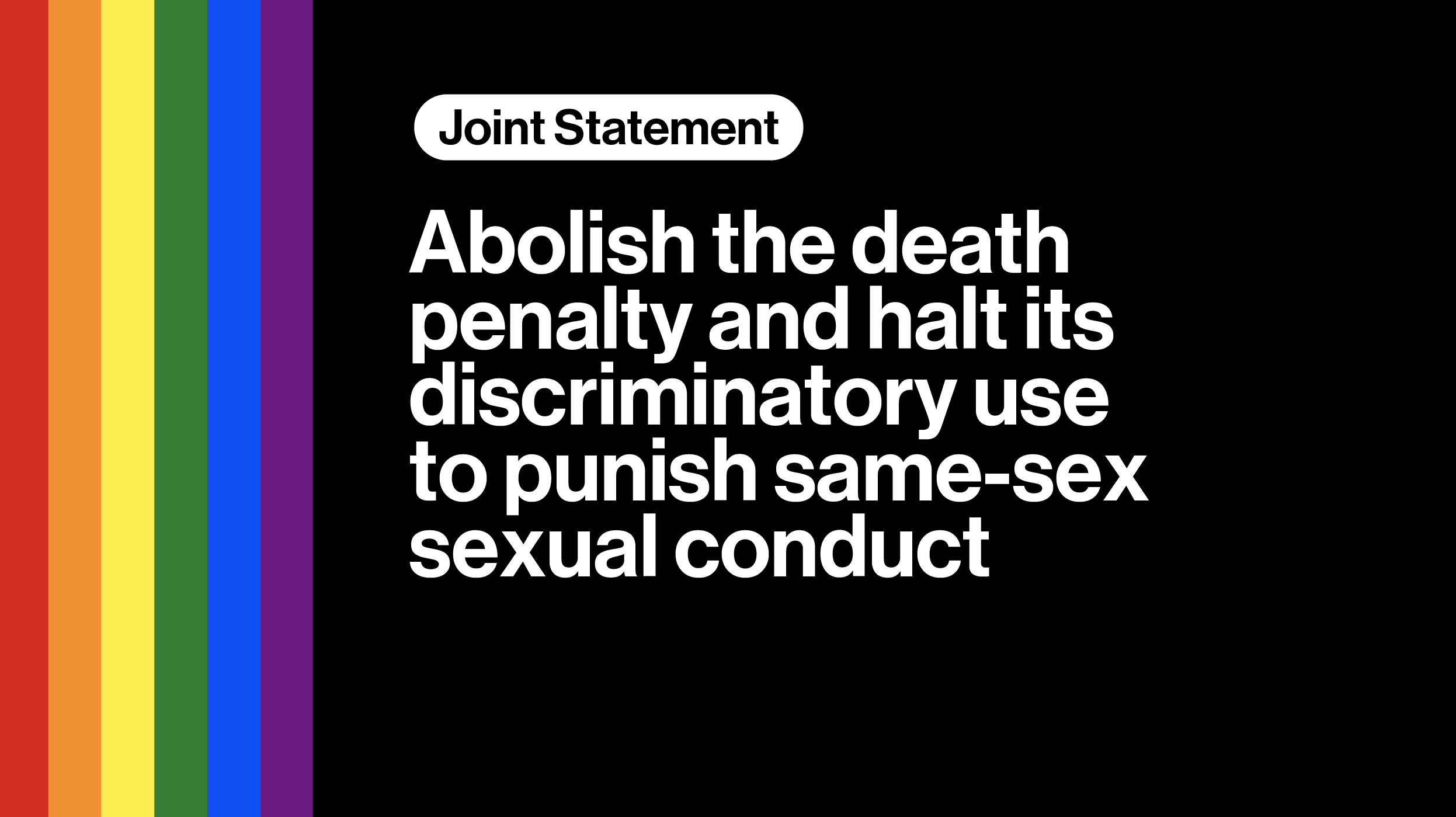Abolish the Death Penalty and Halt Its Discriminatory Use to Punish Same-sex Sexual Conduct
17 May 2022
On the International Day Against Homophobia, Biphobia and Transphobia, ILGA Asia, the International Commission of Jurists (ICJ) and 5 other organisations condemn the death penalty under any circumstances, including as a punishment for consensual, same-sex sexual conduct in Asia, and call for its unconditional abolition.
The use of criminal sanctions, including capital punishment against lesbian, gay, bisexual, transgender, intersex and queer (LGBTIQ) individuals is rampant in Asia, especially against those from disadvantaged socio-economic backgrounds and/or belonging to racial, ethnic or religious minority groups. Moreover, limited access to legal aid and legal representation, as well as bias within the criminal justice system have a detrimental impact on LGBTIQ people’s ability to be guaranteed a fair trial. As of today, 70 countries around the world still criminalise consensual same-sex sexual conduct, including 22 Asian countries. Furthermore, 11 countries — Afghanistan, Brunei Darussalam, Iran, Mauritania, Nigeria, Pakistan, Qatar, Saudi Arabia, Somalia, the United Arab Emirates and Yemen — of which 8 are in Asia, retain the death penalty as a possible punishment for same-sex sexual conduct.
Laws criminalising real or purported engagement in consensual, same-sex sexual relations, including extramarital and premarital sex contravene international human rights law and standards, including the Universal Declaration of Human Rights, the International Covenant on Civil and Political Rights and the International Covenant on Economic, Social and Cultural Rights. Each of these core global human rights instruments affirm the universal and inalienable rights to human dignity, justice, equality and non-discrimination.
“The retention and imposition of the death penalty for consensual, same-sex sexual conduct is a violation of the right to life and of the right to freedom from cruel, inhuman and degrading treatment or punishment. Furthermore, legal provisions criminalising consensual same-sex sexual relations result in violations of a number of other human rights, including the rights to dignity; equality, including equality before the law and equal protection of the law; non-discrimination; liberty and security of person; privacy; opinion and expression; association and peaceful assembly. They may also often lead to denials of the right to access health services and care without discrimination,” said Daron Tan, Associate International Legal Adviser at the International Commission of Jurists (ICJ).
While ILGA Asia and the ICJ oppose the death penalty unreservedly under any circumstances, international human rights law is clear that even those few States that have not yet abolished capital punishment, may only impose death sentences, let alone carry out executions, except for “the most serious crimes, and then only in the most exceptional cases and under the strictest limits” and “in a non-arbitrary manner”. The expression “the most serious crimes” does, obviously, not include consensual, same-sex sexual conduct, as under international human rights law consensual same-sex sexual relations should not be criminalised at all.
In 2017, the UN Human Rights Council passed a resolution condemning the imposition of the death penalty for consensual same-sex sexual conduct. The resolution urged member States that continue to retain the death penalty to ensure that it is not “applied arbitrarily or in a discriminatory manner”.
“We reiterate our position that same-sex sexual conduct should be decriminalised, and the death penalty should be abolished under any circumstances. Further, we urge authorities in all the countries that continue to retain the death penalty to introduce a moratorium on its use, as a necessary first step towards the abolition of the death penalty. Lastly, we call on the authorities to ensure that all necessary safeguards are in place in order to ensure access to legal representation and fair trials for those currently facing the death penalty in connection with their real or purported engagement in consensual same-sex sexual conduct,” said Ajita Banerjie, Research Officer at ILGA Asia.
Background
The UN General Assembly has repeatedly adopted resolutions calling for States that still maintain the death penalty to establish a moratorium on executions with a view to abolishing it. The most recent iteration was passed in December 2020, and urged States to ensure that the “death penalty is not applied on the basis of discriminatory laws or as a result of discriminatory or arbitrary application of the law”.
The UN Human Rights Council, UN Treaty bodies and special procedures have affirmed that the death penalty must never be imposed as a sanction for consensual same-sex relations. The Human Rights Committee, the body of experts tasked with monitoring the implementation of the International Covenant on Civil and Political Rights, has stated that the imposition of the death penalty for offences which should not be criminalised, such as same-sex relations, is incompatible with article 6 of the Covenant.
The Human Rights Committee in its General Comment 36 has explained, among other things, that the term “the most serious crimes” must be read restrictively and appertain only to crimes of extreme gravity involving intentional killing. Crimes not resulting directly and intentionally in death, such as attempted murder, corruption and other economic and political crimes, armed robbery, piracy, abduction, drug and sexual offences, although serious in nature, can never serve as the basis, within the framework of article 6, for the imposition of the death penalty.”
Around the world, 70 countries have retained criminal sanctions for consensual same-sex sexual conduct, including 22 Asian countries. Several countries in Asia have reportedly continued to arrest, detain, charge and convict LGBTIQ individuals pursuant to these legal provisions, including in Bangladesh, Indonesia, Malaysia, and Sri Lanka. Several other countries have also employed discriminatory and arbitrary laws, such as vague laws on “incitement to immorality” and “publishing immoral acts on social media” to target LGBTIQ individuals in Asia, including in Kuwait, Lebanon, Myanmar, and Oman. The capital punishment has also been imposed on same-sex sexual relations in Asia, including in Iran and Saudi Arabia. Media reports suggest that Iran executed 2 men, earlier this year, on charges of ‘sodomy’ after they spent several years on the death row.
Signatories :
6Rang
The Anti-Death Penalty Asia Network (ADPAN)
ASEAN SOGIE Caucus
Capital Punishment Justice Project
ILGA Asia
International Commission of Jurists
Transformative Justice Collective



